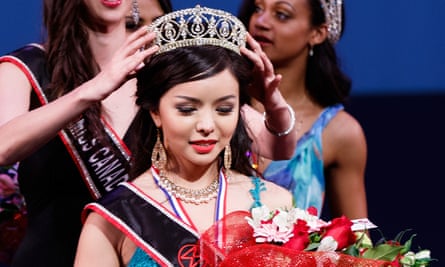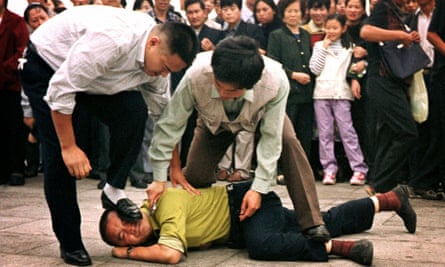Under different circumstances, Anastasia Lin would be a shoo-in for Miss World. A vocal human rights activist with prominent cheekbones, the Canadian candidate for the crown is also an accomplished piano player, a Chinese calligrapher, and an actress with more than 20 credits in film and television.
But this year’s contest takes place in Lin’s native China, which poses a threat for the finalist and her family as Lin practises the spiritual faith of Falun Gong.
Tens of millions in China practice Falun Gong, which combines moral philosophy, meditation and qigong exercises, and emerged out of ideas prevalent in alternative Chinese medicine.
Falun Gong believers have been detained and killed in Chinese labour camps in their thousands, according to activists. The religion was branded an “evil cult” and outlawed in 1999, following a silent demonstration by thousands of Falun Gong practitioners outside Communist party headquarters, who were protesting attacks on its members. Since then, nearly 4,000 practitioners of Falun Gong have reportedly died as a result of detention in camps, though human rights researchers believe the number to be much higher.
Lin, an outspoken advocate on human rights and religious persecution, had refrained from publicly disclosing her faith. But having gained a wider platform thanks to winning the Canadian crown, Lin revealed her faith practice to the Guardian, hoping it would help stop the demonization of the Falun Gong faith and give voice to other Chinese people who are persecuted for their beliefs.
“If I don’t, the oppression will never stop,” Lin said.

Though she has kept her faith out of the public eye, she has been anoutspoken advocate for other minority religious groups persecuted in China, such as Muslim Uighurs, Tibetan Buddhists and Christians.
But it is for her outspoken advocacy work that she says the Chinese ministry of state security is trying to silence her by intimidating her father.
Lin has set foot in China only once since moving to Canada in 2003, but she says her father, who still lives in Hunan province, has been visited by security agents at least once. According to Lin, he is not affiliated with Falun Gong or any religious group.
Just a few days after winning the Miss World Canada crown on 16 May, Lin began receiving text messages from her father asking her to stop her advocacy work. She had highlighted her human rights work in a video and speech at the pageant.
“Do you know the security forces actually came to see me,” Lin said, recounting a text from her father. She said he warned her that if she continued to do her human rights work, she would risked turning her family against each other. “When I asked him more details, he just pleaded that I allow him to live peacefully by not bringing up rights abuses in China again.”
Since then, his business has suffered. “Now people are too scared to be associated with him,” said Lin, who has featured in Canadian films critical of the Chinese regime since the age of 18.
She doesn’t know if agents have visited him again as she said he refuses to talk about it during their brief phone calls. “Nowadays, he always mentions how great the Chinese president is,” she adds. “I think he believes that his phone is being tapped.”
Lin’s case is a classic example of how Xi Jinping’s regime tries to bring Chinese expatriates to heel through the harassment of loved ones left behind, explains Sophie Richardson, China director at Human Rights Watch. “Chinese activists’ parents and siblings are sometimes prosecuted on false allegations while others simply disappear. It amounts to psychological torture,” Richardson said.

But Lin continued her activist work, by writing a Washington Post op-ed in June and by testifying to the US Congress in July about religious persecution in China.By coming out now as a practitioner of Falun Gong, Lin has become its highest-profile follower in the western hemisphere.
“It’s not an organised religion,” she said. “The teachings – established by qigong master Li Hongzi in 1992 – are about finding our authentic self. And this is what I’m trying to do by speaking up. If I don’t, the oppression will never stop.”
Lin’s experience comes amid harsher treatments of religious minorities and human rights lawyers, explains Sophie Richardson. “The Chinese state has become increasingly paranoid and authoritarian since Xi Jinping took power in 2013,” she says. Chinese Christians have been a notable target of late. Authorities have removed crosses from more than 1,200 churches since early 2014 and the country’s security forces this week launched a roundup of church activists who oppose the crosses’ removals.
Lin has also felt ostracised by segments of the Canadian Chinese community, despite her Miss World Canada win and the backing of the Canadian government for her activism. She said she stopped being invited to events by community leaders tied to the Chinese embassy and consulate since her crowning. And to those community events that she is invited to, she is “monitored” by the Chinese consulate.
“They send officials to all social events,” says the actress, who also believes that her phone is tapped.
Whether China will allow her to compete in the Miss World final in Sanya, on Hainan Island, is uncertain, as many Falun Gong practitioners have been denied entry to the country in recent years.
“My aim is not to put an anti-China slogan on the stage,” she insists. “After all, it’s a beauty pageant. But I feel that my presence in that country alone would give people hope. The regime would show itself worthy of hosting the [2022 winter Olympic] Games by allowing me to enter China freely.”

Comments (…)
Sign in or create your Guardian account to join the discussion